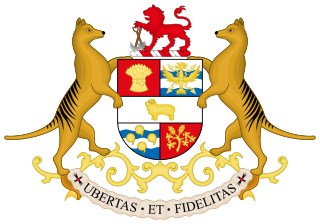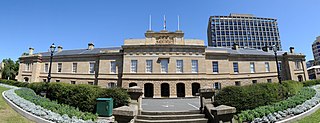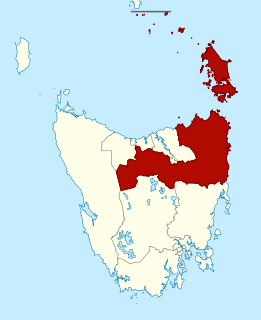Electoral systems of the Australian states and territories are broadly similar to the electoral system used in federal elections in Australia.
The Parliaments of the Australian states and territories are legislative bodies within the federal framework of the Commonwealth of Australia.

The House of Assembly, or Lower House, is one of the two chambers of the Parliament of Tasmania in Australia. The other is the Legislative Council or Upper House. It sits in Parliament House in the state capital, Hobart.

The Tasmanian Legislative Council is the upper house of the Parliament of Tasmania in Australia. It is one of the two chambers of the Parliament, the other being the House of Assembly. Both houses sit in Parliament House in the state capital, Hobart. Members of the Legislative Council are often referred to as MLCs.

The Parliament of Tasmania is the bicameral legislature of the Australian state of Tasmania. It follows a Westminster-derived parliamentary system and consists of the Governor of Tasmania, the Tasmanian House of Assembly, and Tasmanian Legislative Council. Since 1841, both Houses have met in Parliament House, Hobart. The Parliament of Tasmania first met in 1856.

The Tasmanian Government is the democratic administrative authority of the state of Tasmania, Australia. The leader of the party or coalition with the confidence of the House of Assembly, the lower house of the Parliament of Tasmania, is invited by the governor of Tasmania to form government. The head of government is the premier of Tasmania.
Allison Maree Ritchie was a member of the Tasmanian Legislative Council for Pembroke from 2001 to 2009.

The electoral division of Rumney is one of the 15 electoral divisions in the Tasmanian Legislative Council. The division is located in Southern Tasmania to the east of the division of Pembroke.

The electoral division of Derwent is one of the 15 electoral divisions in the Tasmanian Legislative Council. It is situated in the central south of the state.

The Electoral division of Huon is one of the 15 electoral divisions in the Tasmanian Legislative Council. It was created in 1999, however similar electorates of this name have existed since 1900, and members of the Tasmanian upper house for this region appear to have been elected since 1856.
Andrew Paul Harriss was an Australian politician. He was a Liberal Party member of the Tasmanian House of Assembly from March 2014 to February 2016, representing the electorate of Franklin.

Parliament House, Hobart, located on Salamanca Place in Hobart, Tasmania, Australia, is the meeting place of the Parliament of Tasmania. The building was originally designed as a customs house but changed use in 1841 when Tasmania achieved self-government. The building served both purposes from 1841 to 1904, when the customs offices were relocated.

The electoral division of Elwick is one of the 15 electoral divisions in the Tasmanian Legislative Council. The division covers most of the municipality of Glenorchy.

The 2014 Tasmanian state election was held on 15 March 2014 to elect all 25 members to the House of Assembly. The 16-year incumbent Labor government, led by the Premier of Tasmania Lara Giddings, sought to win a fifth consecutive term against the Liberal opposition, led by Opposition Leader Will Hodgman. Also contesting the election was the Greens led by Nick McKim. The Palmer United Party made a significant effort in the election.
Stephen John Wilson is a former Australian politician from Tasmania, serving as an independent member of the Tasmanian Legislative Council from 1981-1999.

The electoral division of McIntyre is one of the fifteen electorates in the Tasmanian Legislative Council, it includes Flinders Island, the northern east coast of Tasmania, and regional areas south and west of Launceston. It is named after Margaret McIntyre, who was the first woman to be elected into the Parliament of Tasmania in 1948.

The electoral division of Clark is one of the five electorates in the Tasmanian House of Assembly, it is located in Hobart on the western shore of the River Derwent and includes the suburbs below Mount Wellington. Clark is named after Andrew Inglis Clark, a Tasmanian jurist who was the principal author of the Australian Constitution. The electorate shares its name and boundaries with the federal division of Clark.
Periodic elections for the Tasmanian Legislative Council were held on 1 August 2020. They were initially planned for 30 May; however, due to the COVID-19 pandemic, the electoral commission delayed the date of the election until August, in anticipation for the next Legislative Council sitting date on 25 August.
Periodic elections for the Tasmanian Legislative Council were held on 1 May 2021. The three seats that were up for election are Derwent, Mersey and Windermere. They were last contested in 2015. Only two of the three seats were actually contested, as the incumbent candidate for Mersey, Mike Gaffney, was returned unopposed.
Periodic elections for the Tasmanian Legislative Council were held on 7 May 2022. Two seats were up for a regularly scheduled vote; Elwick and McIntyre. Simultaneously a by-election was held in the seat of Huon, following the resignation of the incumbent member Bastian Seidel.









